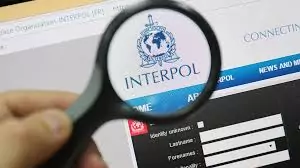
Can INTERPOL make arrests?
The International Criminal Police Organization (INTERPOL), is the world’s largest intergovernmental organization, bringing together police forces from over 195 countries. Its mission is to facilitate international police cooperation between local law enforcement agencies from different countries to make the world a safer place.
Despite its global reach and status, many people wonder whether Interpol can arrest. But how does this organization help in apprehending criminals and can it arrest them? Let’s take a look at what crimes INTERPOL deals with and whether INTERPOL pursues specific individuals.
What is INTERPOL?
INTERPOL (International Criminal Police Organisation) is a global organization that coordinates the cooperation of national law enforcement agencies from more than 190 countries to fight international crime. INTERPOL facilitates the exchange of information on suspects, wanted persons, and arrest warrants by providing tools such as the Red Notice, which is an international alert that notifies law enforcement agencies in member countries of a person wanted in connection with a crime.
A Red Notice is not an arrest warrant but serves as a request to INTERPOL member states to detain a person pending extradition to the country where he or she is charged. However, it is important to note that INTERPOL does not have arrest powers and does not make international arrests on its own.
INTERPOL’s role is to coordinate global police cooperation and provide access to resources, such as databases, which allow member countries to exchange information on arrest warrants. INTERPOL lawyers are also important in helping internationally wanted persons to protect their rights.
Can INTERPOL arrest criminals in any country?
INTERPOL’s capabilities are limited to ensuring cooperation between local law enforcement agencies of different countries but do not include direct arrests. The question of whether INTERPOL can detain someone on its own is not relevant, as this function remains the responsibility of the national law enforcement agencies of each country.
This international organization provides information through its notices, such as the INTERPOL Red Notice, which informs member states of persons wanted on a warrant issued in another country. However, the final decision on detention rests with local authorities, who are guided by national law. Thus, although INTERPOL can assist in locating a person, the actual arrest is always made by local law enforcement officers per their own legal regulations.
Does INTERPOL pursue specific individuals?
INTERPOL can focus on specific individuals, but its role in prosecution is limited to issuing alerts, such as INTERPOL Red Notices, which inform law enforcement authorities in member countries that an individual should be apprehended based on a lawful arrest warrant from the initiating country. Red Notice alerts are an important mechanism for informing states of persons wanted for prosecution or enforcement, but they do not provide a right of arrest and do not constitute an international arrest warrant. INTERPOL only acts in response to a request from a member country and does not have unilateral authority to prosecute someone internationally.
On the other hand, INTERPOL channels allow for the rapid dissemination of information about wanted persons, including diffusions, which are often used for critical situations and provide rapid information exchange about serious ordinary law crimes or suspects. Although less formal, these notices function similarly to red notices, allowing member states to act in cases where a case requires immediate action.
Interpol’s arrest powers are limited to lawful cooperation between countries. Participating countries must confirm that the Red Notice is per domestic laws and does not violate Interpol’s constitution, which prohibits activities of a political, military, religious, or racial nature. In this way, Interpol promotes international legal cooperation without making arrests directly but by ensuring that states cooperate based on clear standards.

What crimes does INTERPOL deal with?
INTERPOL deals with a wide range of crimes that require close international cooperation between states. Important areas of its work include the fight against terrorism, human trafficking, drug trafficking, and cybercrime. These crimes regularly cross state borders, so their successful investigation depends on the active exchange of information and cooperation between member states.
In the fight against terrorism, INTERPOL provides analytical and technical assistance, coordinating the actions of law enforcement agencies from different countries. The organization creates opportunities for the exchange of important information on criminal groups involved in human trafficking, as well as for tracking drug trafficking. In this area, Interpol’s arrest powers depend on the local law enforcement agency, but through resources such as the Interpol red notice, the organization can help countries identify and prosecute suspects.
Cybercrime is also an important part of INTERPOL’s work, as online crime has become widespread in today’s globalized world. The organization supports its member countries in the fight against cyber threats by training specialists, providing information support, and helping to coordinate actions against international cyber criminals.
Contact us now!
Your situation requires immediate action. Contact our lawyers for a free consultation at [email protected]
and learn what legal tools can help you remove the notice and protect your rights.

Can Interpol target specific individuals?
While Interpol agents can’t make international arrests, the organization can target specific people involved in international crimes through red notices and diffusions. That can lead to the temporary detention of an individual at the request of a member country through its national central bureau. However, the decision to extradite a person sought by a red notice depends on the judicial authorities of the arresting member state.
Contact Interpol Lawyer to protect your rights
If you or your loved ones are at risk of receiving an arrest warrant or an Interpol Red Notice, it is important to contact Interpol lawyers immediately. Experienced lawyers specializing in international law and Interpol’s red notice will help you understand the complex legal situation and explain how to protect your rights in the event of a possible arrest.
INTERPOL does not have the authority to make arrests on its own, but notifications through its system may affect your freedom of movement. Professional legal support will help reduce the risks of extradition or detention in other countries. Do not wait until the situation becomes more complicated. Contact an Interpol lawyer now to get advice and ensure reliable protection in matters related to Interpol’s arrest warrant powers.








